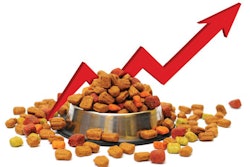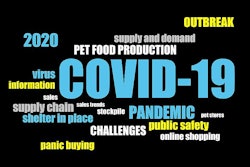
Like other digital technologies, virtual events suddenly grew in importance as the COVID-19 pandemic forced the business, academic and other professionals to go online for trade conferences, such as Petfood Forum CONNECT. Not mingling with peers from around the world reduces contagion and protects public health, but other less obvious benefits come from virtual events. While the environment may not be top of mind right now, going online tends to be much greener than going on a plane. Likewise, although event planners may not have gone digital for this reason, virtual conferences level the playing field among attendees by improving access for those of various economic levels around the world. By allowing an influx of ideas from these otherwise marginalized groups, pet food industry conferences may gain insights that would have escaped notice at a face-to-face conference.
“Face-to-face international conferences and trade shows are only really suitable for a small proportion of society,” Dr. Hannah Fraser, ecologist at the University of Melbourne said. “These events don’t include information and products from the portions of society that are unable to attend. These people have valuable things to contribute and we are all worse off if we can’t find out what they know and what products they have.”
In one of Fraser’s studies, published in Conservation Biology, her team examined virtual conferences’ value for ecology and conservation. Beyond reducing pollution and conserving resources, her team noted that virtual conferences also use less of attendees’ resources. Lower costs and other barriers make virtual events easier to attend, in general. That particularly benefits low-income, accessibility challenged or otherwise disadvantaged people worldwide.
“Oversees travel is expensive, particularly for people who live in countries with unfavorable exchange rates,” Fraser said. “People with less money or from less wealthy nations just can’t afford to travel as much and the societal reliance on travel for conferences and business exchanges means that they are disadvantaged. This is equally true for people who are less able to travel due to caring responsibilities, strict visa requirements or chronic illness. Switching to virtual conferences reduces this disadvantage allowing people to exchange ideas equally, provided that they have access to stable internet, which is certainly not a given in all regions.”
Pet food industry virtual events reduce pollution
While patchy internet connections may slow these attendees, they can find a local internet café or library with decent Wi-Fi with far less effort that getting a visa or hopping on a plane. In many regions travel was already costly and difficult, and now the pandemic has added a deadly risk to the endeavor. As the disease disrupted human activities, the COVID-19 pandemic both benefited and harmed the Earth’s ecosystems and resources. Fewer commuters on the highways and skyways reduced air pollution from travel and transport. Likewise, shuttered factories produced no waste and used no raw materials. On the other hand, illegal logging and poaching grew as law enforcement socially distanced themselves or were needed elsewhere.
Virtual conferences stand on the environmental benefits side of that equation. By reducing travel, virtual events lower pollution and resource use. One study, published in PLoS ONE, estimated that taking a single conference trip accounted for approximately 7% of an individual’s annual carbon footprint, a measure of the greenhouse gas pollution produced by an individual’s activities.
“By far the biggest impact of flying on the environment is through carbon emissions, both because flying produces more carbon emissions than other forms of transport and because the convenience and speed of air travel makes long distance travel much more appealing,” Fraser said. “Unfortunately, regardless of mode of transport long distance travel produces lots of carbon emissions.”
For the time being COVID-19 has forced a reduction in that pollution. As that happened, events like Petfood Forum CONNECT were forced to move rapidly online for 2020. Similarly, pet owners shifted retail channels away from brick-and-mortar stores to online retailers. As more countries lift movement restrictions, a portion of these pet food buyers may continue using e-commerce, but exactly how large a percentage and for how long remain unknown. Likewise business, academic and other industry events eventually will return to face-to-face formats, but a virtual components may remain. Despite being vestiges of a virus, these online conference may prove healthy for the industry. Virtual conferences may allow pet food ingredient, equipment and other suppliers to connect with dog, cat and other pet food producers worldwide, regardless of many physical and economic barriers.



















